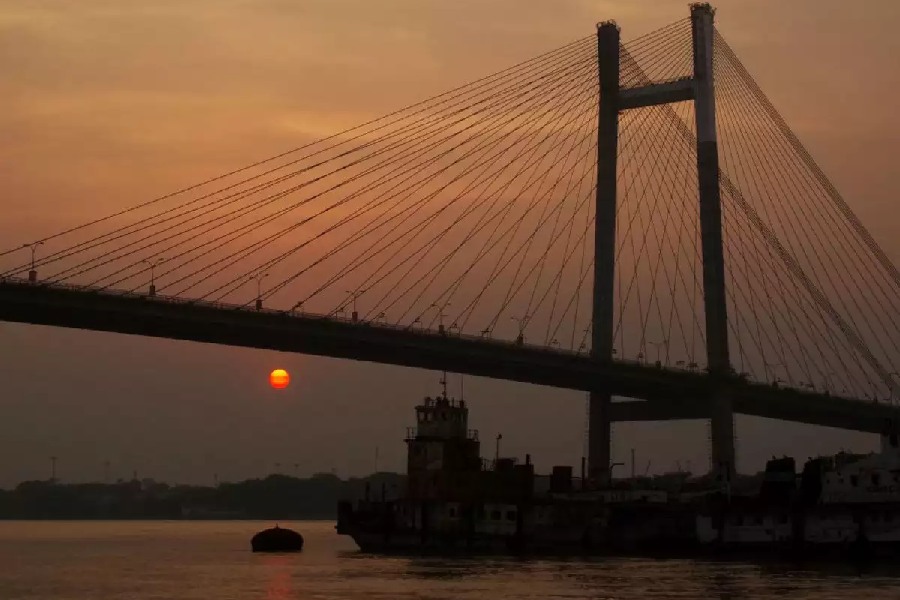Clearer pavements, fewer banners and hoardings, roads devoid of undulations, more buses, a leash on unruly autorickshaws and a crackdown on the parking mafia: these are some of the things that Kolkatans wish to have this year.
The Telegaph lists some of the wishes after speaking with residents across the city.
Free our pavements
The rules for street vending says hawkers can set up stalls on only one-third of a pavement’s width. But the rule has been implemented in only two places — Oberoi Grand arcade and in Gariahat (only on some stretches).
“It is impossible to walk on any pavement in New Market. Even the roads around New Market have been taken away by hawkers. Almost all roads in Kolkata have hawkers sitting on pavements, leaving very little space for pedestrians,” said a south Kolkata resident.
Several Kolkatans said walking along pavements is a horrific experience.
“The KMC should ensure that there is enough space on the pavements. They are working at a very slow pace,” said a Ballygunge resident.
"Improve the walking experience. There is so much to see in Kolkata," said the resident.
Advertisements
Pavements need to be made safer by removing multiple broken hoardings along them. Parts of such hoardings hang dangerously over pavements and pose a serious risk to pedestrians.
Most of the hoardings have become defunct, but the structures have not been removed.
On Tuesday, The Telegraph found two such dilapidated hoardings at the Rashbehari crossing. The tin sheets have come off and were fluttering. The rusted edges can injure pedestrians if they break and fall.
Besides, the city is full of temporary banners and posters. The banners are coming up in places that were hitherto free of them. “I saw five banners tied to the guardrails at the Chingrighata crossing. This place did not have banners even a few months back,” said a New Town resident.
A KMC official said they conduct regular raids against temporary banners put up without the permission of the civic body. “We remove such banners,” said the official.
Act against honking
Arbitrary and unreasonable honking is rising and it becomes difficult to stand at a crossing or sit inside a vehicle with windows rolled down.
“The police must do something immediately to stop this menace of honking,” said a resident of central Kolkata.
An officer in the Kolkata police’s traffic department said vehicles are prosecuted for unreasonable honking but it is difficult to identify a vehicle among tens of others if the drivers of all of them keep honking.
Flatten the roads
Commuting in Kolkata is often painful because most of the roads are so bumpy that the ride becomes a backbreaking one.
Park Street, lined with some of the most popular restaurants, is among the worst roads in terms of undulations. It is hard to spot even a 25-metre stretch that is without a bump or an undulation.
SP Mukherjee Road is another thoroughfare with innumerable bumps and undulations.
KMC officials said they have flattened several roads in the city, one of them being SN Banerjee Road.
“We will undertake a through repair of SP Mukherjee Road. The new road surface will not have any bumps of undulations,” said the KMC official.
Rein in autorickshaws
Autorickshaws set their own road rules but that should change — this was a common appeal of many Kolkatans.
Prosecute autos for jumping a stop-line and waiting on a zebra crossing, for sudden switching of lanes and for stopping anywhere to pick up passengers.
In some places, auto operators have set up stands near apartment buildings, much to the inconvenience of the residents.
“Autorickshaws have made the road outside our apartment building a terminal point. They do not spare even the gate of the building,” said Saptarshi Bhose, a resident of an apartment block near South City Mall.
More buses on road
The number of buses has dwindled and finding a bus on many routes after 9pm is nearly impossible.
“The government should seriously focus on increasing the number of buses. Nowadays I have to wait for up to an hour at Esplanade for a bus to Behala after 8.30pm. Earlier, I would have to wait for 15-20 minutes,” said Manas Mukherjee, a resident of Behala.
More buses mean people will have to depend less on private transport and taxis. That will lead to lowering of emission and improvement of the air quality, as well as reduction of traffic snarls.
